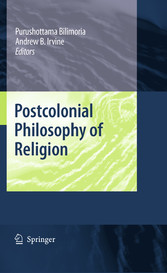Suchen und Finden
Postcolonial Philosophy of Religion
1
Title Page
2
Copyright Page
3
Preface
5
Contents
6
Contributors
8
Introduction: The State of Philosophy of Religion and Postcoloniality
12
Reference
16
Part I: Surveying the Scene
17
What Is the “Subaltern” of the Philosophy of Religion?
18
The Postcolonial/Subaltern Critique Revisited
26
Dreamy Scenarios
32
Finale
34
Notes
37
References
40
Philosophy of Religion as Border Control: Globalization and the Decolonization of the “Love of Wisdom” (philosophia)
43
The End of European Colonialism and the Crisis ofWestern Philosophy
45
The Paradoxical Parochialism of “Postcolonial Theory”
49
Translating Wisdom Traditions as “Religions” - The Price of Crossing the Border
52
The Subalternization of Non-western Knowledges
55
Subalternization and Resisting Cultural Essentialism
56
Conclusion:W(h)ither the Comparative Philosophy of Religion?
58
References
59
The Third Eye and TwoWays of (Un)knowing: Gnosis, Alternative Modernities, and Postcolonial Futures
62
1
62
2
66
3
69
4
72
References
73
Part II: "India"
75
Mispredicated Identity and Postcolonial Discourse
76
Introduction
76
Sa nkar¯ac¯arya on Adhy ¯ asa
81
The Euro-Christian Colonial Project
88
Neo-ved¯antic Colonialism
96
Conclusion: Postcolonial Complicity and Dalit Protest
104
Notes
105
References
106
On the Death of the Pilgrim: The Postcolonial Hermeneutics of Jarava Lal Mehta
109
Notes
120
References
122
Western Idealism Through Indian Eyes: A Cittamatra Reading of Berkeley, Kant and Schopenhauer
124
Introduction: Metahermeneutic Preliminaries
124
Cittamatra Is Idealism
127
Vasubandhu’s Cittamatra Idealism
130
Berkeley and Parikalpita-Svabh¯ava
132
Kant and Paratantra-Svabhava
132
Schopenhauer and Parinispanna-svabh ¯ ava
135
The Progressive Character ofWestern Idealism
137
Comparative Philosophy as a Road to Conversation
138
Notes
139
References
141
An Approximate Difference: Proximity and Oppression in the West’s Encounter with Sikhism
143
Introduction
143
Incorporating the Foreign: On the Strange Convergence of Pluralism and Stereotyping
145
Violent Religion. Returning Sikhism to Itself
149
Engaging the Other: On the Solicitousness of Sikh Warfare
151
From Battle Play to Playing Soldiers: Colonialism and the Reform of Sikh Militancy
155
Conclusion
157
Notes
158
References
159
Max M¨ uller and Textual Management: A Postcolonial Perspective
161
Colonial Patronage
162
Trope of the Child
163
Classification
165
Concluding Remarks
167
Conclusion
170
Notes
171
References
171
Auto-immunity in the Study of Religion(s): Ontotheology, Historicism and the Theorization of Indic Phenomena
173
Questioning Post-colonial Theory in Light of the “Return of Religion”
173
Indology, Race Theory and the (Re-)Conceptualization of Religion(s)
177
The Unbearable Proximity of the Orient
181
Co-origination, or, the Difference Between Religion and History
182
Linking the Aufhebung to the Ontological Proof for God’s Existence
184
The Reconstitution of Indology
185
The Comparative Imaginary & the Manufacture of Native Informancy
186
Reading Comparativism in the Study of Religion(s) as a Spectrology of “theWest”
188
Notes
190
References
190
Part III: "America"
192
The Meaning and Function of Religion in an Imperial World
193
The Religion of Empire and the Unmasking of Imperial Man
194
The Overcoming of Spirit and Man
194
God and the Self-recognition of Imperial Man
197
Towards a Post-Imperial Critique of the Critique of Religion
202
Recognition, the Dead God, and the New Project(ion)s of Empire
204
Notes
206
References
210
Cultural Participation and Postcoloniality: A U.S. Case Study
212
Introduction
212
Part I: Fleischacker and Culture as a Moral Posit
213
Part II: Mestizaje. Latino Refractions Through Culture and Religion
220
Conclusion
228
Notes
230
References
232
Imperial Somatics and Genealogies of Religion: How We Never Became Secular*
234
Introduction
234
Imperial Somatologies
237
On Foucault’s Genealogy
240
Religion and Racism
242
Spiritual Conquest and the Inquisition
245
Notes
247
References
248
De-colonial Jewish Thought and the Americas
250
I
250
II
253
III
256
IV
261
V
266
Notes
266
References
268
Enduring Enchantment: Secularism and the Epistemic Privileges of Modernity
272
Notes
289
References
290
Part IV: Uneasy Intersections
292
“Uneasy Intersections”: Postcolonialism, Feminism, and the Study of Religions*
293
On Shutting Up
295
Who Speaks for Whom?
296
Instabilities
297
Notes
299
References
299
Postcolonial Discontent with Postmodern Philosophy of Religion
300
Preamble
300
What Is Postmodernism?
302
Postmodernism Revisited
307
Part I
309
Is There Difference Outside of Postmodernism?
311
Part II
315
Unconcluding Part III
318
Berkeley Modern-Posts
323
References
323
Afterword: Religion and Philosophy between the Modern and Postmodern
325
Notes
332
Index
333
Alle Preise verstehen sich inklusive der gesetzlichen MwSt.




















